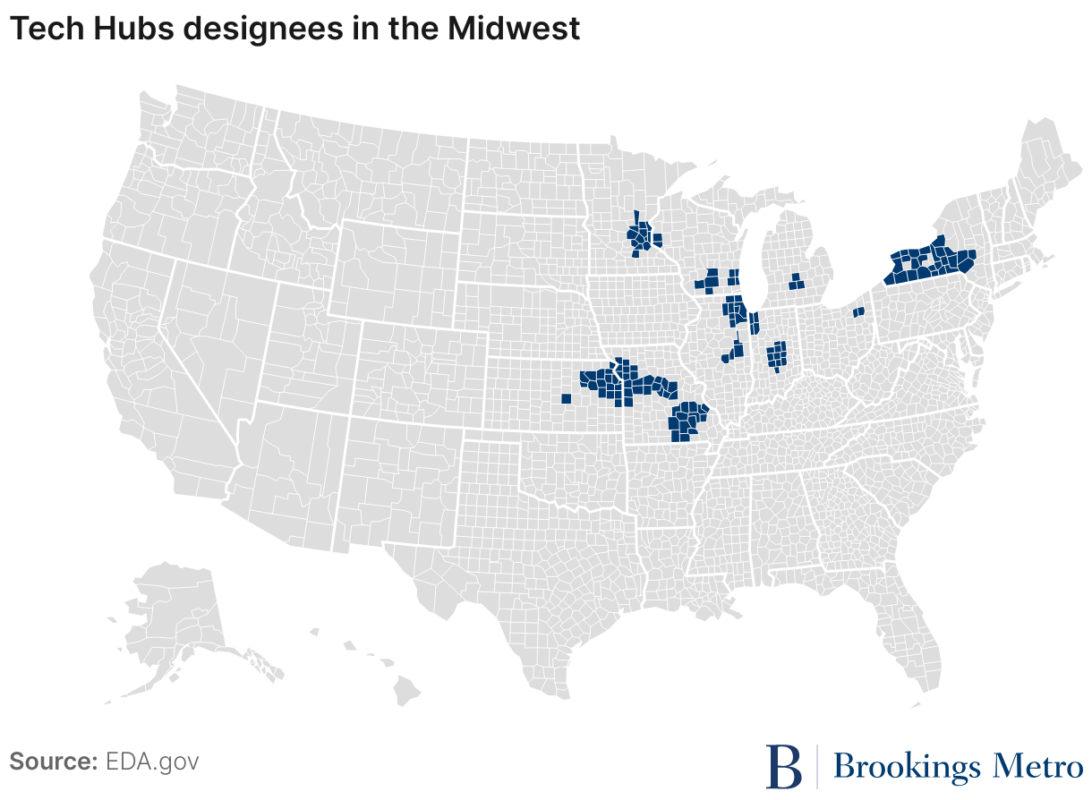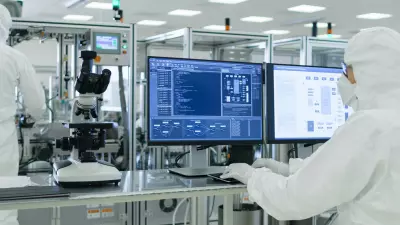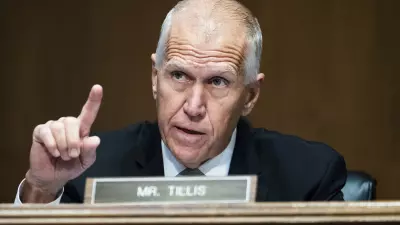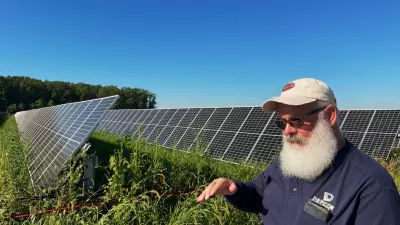This piece first appeared on Brookings.edu

The U.S. is beginning to roll out striking instances of place-based industrial policy — a good amount of it focused on federal investment in heartland geographies still making a spotty transition from their “old” industrial economy to a new tech-driven model.
Most notable are the investments from the National Science Foundation’s (NSF) Regional Innovation Engines program and the Commerce Department’s Regional Technology and Innovation Hubs (Tech Hubs) program — each funded as part of last year’s bipartisan CHIPS and Science Act and financed by the FY 2023 omnibus appropriations bill.
Last August, the NSF named 16 regions as finalists for its Regional Innovation Engines competition. Eight of these regions were in the industrial Midwest, and 10 within a broader “heartland” geography, with proposals ranging from breakthroughs in quantum computing and energy storage to smart water systems and sustainable manufacturing materials. And last week, the agency announced lead organizations in Fargo, N.D. and Chicago as two of the program’s winners.
Likewise, the Commerce Department’s recent announcement of Tech Hub designations was similarly heartland-centric, with multiple proposals that aim to translate innovations into new businesses and jobs in emerging sectors of critical national interest. (These designees will soon submit their final proposals to win full awards.)

Add it up and this recognition of value with the possibility of follow-up investment in heartland communities is writing a new story about the industrial Midwest and its technology-oriented revitalization.
As we’ve noted before, the Midwest has formidable innovation assets upon which to build a tech economy and leadership in multiple emerging sectors. Central to this is one of the world’s most powerful nexuses of ideas, technology, and talent-generation: the 20 Midwestern universities that rank among the 200 best in the world. Enabled by these institutions as well as the region’s globally engaged companies and skilled workers, many Midwestern communities long ago made a successful transition from the signature smoky industries that helped them flourish in the 20th century to cutting-edge, high-tech leadership in the 21st century.
For example, Pittsburgh has recovered from the collapse of its steel industry in the 1970s and 1980s by building out competencies in computer and data science, AI and automation, and now, medical treatments developed at Carnegie Mellon University and the University of Pittsburgh. Today, the “Steel City” boasts a flourishing collection of national innovation centers and AI and robotic tech startups (with over 100 startups in these two sectors alone). Across the region, Minneapolis-Saint Paul — once the flour-milling capital of the world — is now a dynamic finance, retail, medical, and bio-medical hub. Nearby Madison, Wis. — home to the University of Wisconsin and its University Research Park — hosts over 125 startups.
Focusing on the Midwest’s 11 Tech Hubs designees, the technologies being developed in the region advance a compelling picture that can help further a new identity for the Rust Belt. Examples include:
- The Bloch Tech Hub: Developing next-generation quantum computing and communications technologies. Anchored in Illinois, Indiana, and Wisconsin.
- The iFAB Tech Hub: An Illinois-based precision biomanufacturing center.
- The Kansas City Inclusive Biologics and Biomanufacturing Tech Hub and Indiana’s Heartland BioWorks: Two new biologics development and manufacturing hubs.
- The New Energy New York (NENY) Battery Tech Hub: End-to-end battery development and manufacturing in Upstate New York.
- The Wisconsin Biohealth Tech Hub: Focusing on innovations in personalized medicine.
- The Sustainable Polymers Tech Hub: An Ohio-based hub developing more sustainable plastics and rubbers.
- The Minnesota MedTech Hub 3.0: Developing smarter medical technologies in Wisconsin and Minnesota.
- The Critical Minerals and Materials for Advanced Energy Tech Hub: Mineral processing in Missouri.
- The Materials Advancement and Research Solutions Strategy Development Consortium: Focusing on advanced materials needed for semiconductor production. Based in East Lansing, Mich.
- NY SMART I-Corridor Tech Hub:Enhancing regional semiconductor manufacturing capabilities in Upstate New York while ensuring opportunity for underserved communities.
From next-generation quantum computing to new medical breakthroughs to the advanced materials necessary for future semiconductor manufacturing, the Midwest’s hubs demonstrate that the innovation needed to keep America’s competitive edge extends well beyond coastal “superstar” hubs such as Boston and Silicon Valley.
With that said, it’s far from certain that a complete Midwestern transition will actually occur. Technology-based economic development remains a challenging pathway for any region, let alone one with a tough history of deindustrialization and brain drain. There are no guarantees for anyone.
What’s more, while federal investments are intended to accelerate what is becoming a market-driven flywheel in many Midwest communities, uncertainty surrounds them too. For example, appropriations for the Tech Hubs program remain woefully below their approved levels. Fully funding these federal place-based investment programs matters intensely for those with high hopes for Midwestern transformation.
In the meantime, it remains easy to misperceive the Midwest as merely “flyover” country, with industries that mattered to the last century’s economy but not to today’s tech-driven one. However, the geography of the nation’s new industrial strategy demonstrates that the region and its innovation infrastructure are reemerging as key focal points for the desire to invent, commercialize, and scale-up the technologies that will advance American competitiveness.
John Austin is the former President of the Michigan State Board of Education. Austin directs the Michigan Economic Center www.MichiganEconomicCenter.org a center for ideas and network-building to advance Michigan’s economic transformation. He also serves as a Non-Resident Senior Fellow with the Brookings Institution, the Chicago Council on Global Affairs, and the Upjohn Institute where he leads these organizations efforts to support economic transformation in the American Midwest. Mr. Austin also Lectures on the Economy at the University of Michigan.
Mark Muro is a Senior Fellow at Brookings Metro, focusing on the interplay of technology, people, and place as they are altered by positive and negative disruptions. Muro’s recent work has focused on the embrace by the U.S. federal government of what Muro calls “place-based industrial strategy,” including through the government’s Regional Tech Hubs initiative. This work has drawn on Muro’s work on regional “growth centers,” a strategy by which the nation seeks to unlock innovation and growth in new places across America. Muro’s work on these issues looks closely at the interplay of federal strategy and state and regional delivery.
The Brookings Institution is a nonprofit organization whose mission is to conduct in-depth, nonpartisan research to improve policy and governance at local, national, and global levels.







